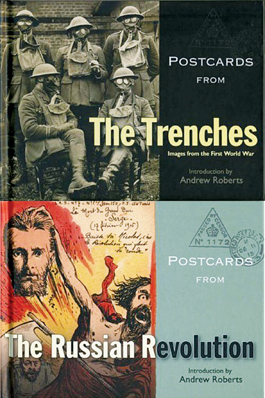home | metro santa cruz index | the arts | books | review

Book Reviews
'Postcards from the Trenches' and 'Postcards from the Russian Revolution;' 'This Land Is Their Land: Reports from A Divided Nation'
Postcards From the Trenches/Postcards From the Russian Revolution
Introductions by Andrew Roberts; Bodleian Library, distributed by the University of Chicago Press; 96 pages/112 pages; $20 each, hardback
"Wish you were here." The ur-sentiment of postcard scribblers since vacations immemorial doesn't always apply. The average traveler--unless we're talking about John Reed--might not want to be caught up in the chaos of the Russian revolution or the slaughter of the trenches in World War I. And yet, as demonstrated in these two postcard-size collections of period postcards, there truly exists a card for every occasion, even insurrection and mass warfare. Both books are drawn from the collection of John Fraser. Postcards From the Russian Revolution samples sights from three uprisings: 1905, February 1917 and October 1917. The images range from touristic photo ops (the Winter Palace in St. Petersburg) to royalist kitsch (family portraits of the Romanovs on the occasion of their tercentenary jubilee, just four years before their fall) to miniature propaganda posters, both Czarist ("The soldiers at the front are dauntlessly holding the line against the enemy. Take part in this united action and subscribe to the [military] loan.") and Marxist (a shot, possibly altered, of Lenin chatting up workers in Red Square). On the flip side of some cards we can read firsthand briefs from history, including a message penned a day after the emperor abdicated. The volume ends with four graphically arresting anti-clerical cartoons from the Moscow magazine Atheist Working at the Lathe and a baby picture of a chubby-cheeked Lenin, complete with forelock--who wouldn't want to find that in their mailbox? The Postcards From the Trenches tend to be a bit starker, although an air of optimism clings to posed images like "Tommies at Work," depicting British soldiers crouching in a verdant forest; a postcard on the next page, in which French scouts roost in a bare-branched tree, demonstrates how quickly the shelling reduced the landscape to rubble. The final result can be seen in a French card called "No Man's Land," which presents a vista of man-made desolation. A few colorful cards designed for home-front morale boosting include some poignant messages ("I waited ... but never saw you"), but most of the cards are sepia-toned images alternating between the boredom of huddling in trenches and the aftermath of an attack. A French card provides a close-up view of skulls and scattered helmets at Verdun, where more than 250,000 men died. As the accompanying text comments, "It is difficult to imagine someone sending this postcard."
Michael S. Gant
This Land Is Their Land: Reports From a Divided Nation
By Barbara Ehrenreich; Metropolitan Books; 235 pages: $24 hardback
Veteran rabble-rouser and capitalism-critiquing journalist Barbara Ehrenreich boldly writes, "Economic issues are moral issues," a belief and theme that she expounds on in her latest collection of social-commentary essays. Erudite yet accessible and scathingly sardonic, the author of Nickel and Dimed has again written a book that seeks to stir the radical, class-conscious spirit of the American left--and leave its members both outraged and rolling in laughter. The former New York Times columnist shuns the esoteric and hands-off approach often employed by elitist academics who have little contact with the masses for whom they purport to speak (like Maureen Dowd). Instead, Ehrenreich talks with Target employees who were interrogated and denied access to bathrooms and interviews an exploited food service worker who was harassed after discussing unionization. The feminist journalist doesn't just cite studies showing the abysmal failure of abstinence-only education; she calls up an abstinence educator to see if she herself could qualify to become one, and even quotes the educator as saying she's "like an animal" with her husband in bed. Ehrenreich's hallmark strategy for the myriad issues she tackles--class oppression, immigration, corporate greed, health care, feminist ideology, etc.--stems from her astounding ability to present a case that these issues are all connected. In the essay "Our Broken Mental Health System," Ehrenreich opens with a discussion of the Virginia Tech massacre, then critiques both the lack of access to mental health and the overmedicalization of therapy, where hyper 9-year-olds and disillusioned adults alike "have to be drugged or disciplined into accepting their fate. What therapy aims to achieve is not 'health' but compliance with social norms," she states. But before one can swallow the Prozac or say "touché, Barb," she full-circles the essay with a call for gun control--all within a span of three pages. Although some of her essays stretch this it's-all-connected tactic a bit thin, her esemplastic skills for concisely weaving a common social and economic justice thread throughout her book--and if they accept it, through readers' minds--is truly galvanizing
Molly Zapp
Send a letter to the editor about this story.
|
|
|
|
|
|